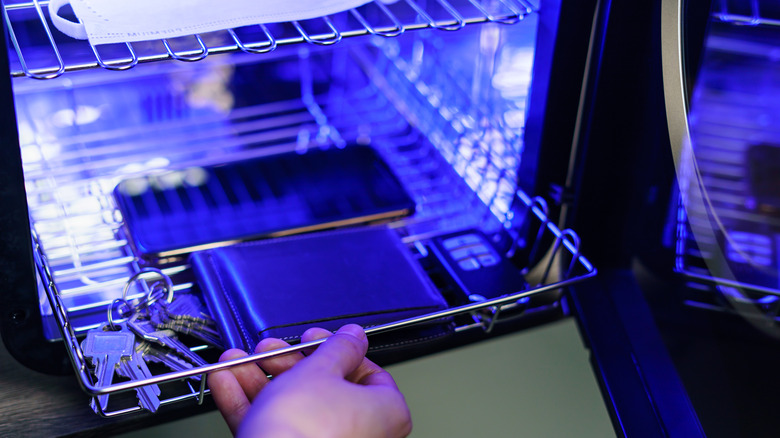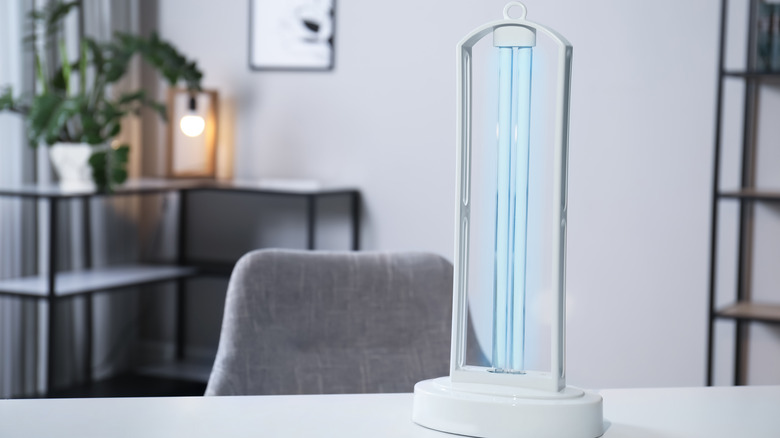Should You Use UV Light To Clean Small Electronics?
Our phones, tablets, laptops, and remote controls are handled countless times throughout the day, and they can end up accumulating quite a lot of bacteria. Particularly if someone at home recently recovered from being sick, you may be wondering which electronics should be sanitized after getting over the flu, if these items are now contagious, and how to clean them. One popular method of eliminating germs on small electronics is the use of UVC light sanitizers. These can be a handy solution in a multiperson household or a home shared with someone who is immunocompromised, but you should only use them if they're well-designed and you have a real need for thorough sanitization at home. For most of us, wiping down our electronics with classic alcohol wipes is a more affordable and more reliable option.
Used for decades to treat water, air, and health care equipment, UVC sanitization has grown in popularity for personal use since the advent of the coronavirus pandemic, which sparked conversations around cleanliness and germs in our homes. At the height of the coronavirus pandemic, many brands released UVC light sanitizers along with air purifiers and other smart tech to make your home healthier, capitalizing on newfound fears around bacteria and viruses. These devices continue to be popular, usually available as sanitization wands, boxes, or lamps.
Well-designed UV light sanitizers work
UVC is the only type of UV light unable to penetrate the ozone layer — and the one that permits targeted sanitization. It effectively penetrates the genetic material of germs and viruses and damages the bonds sufficiently to prevent any further growth. While it's been proven highly effective in professional settings, studies looking into the effectiveness of UVC light at home have resulted in mixed findings.
UVC light sanitization is most effective on flat, nonporous surfaces, such as phone and tablet screens as well as laptop cases, as the ultraviolet rays don't penetrate beyond the surface. At-home sanitization devices are often not as effective as those used in professional health care settings. However, research published in the National Library of Medicine in 2023 shows that even handheld sanitization devices for at-home use can be effective, as long as they are well-designed. The key to their functionality is the output of the correct ultraviolet wavelengths, good coverage and exposure times for your electronics, and the device's built-in safety features.
UV light sanitizers are safe to use at home
A common concern is whether UVC light poses similar health risks as exposure to sunlight, such as sunburn and skin damage. Direct exposure to UVC light can result in severe burns and temporary eye injuries, so you should never look directly into it. This is why it is generally recommended to opt for a box format when choosing a UVC light sanitization device. While wands and lamps emit UVC light openly, well-designed sanitization boxes only activate when closed and shut off automatically once opened, containing the exposure. Plus, some of the boxes double as phone chargers, which can be quite convenient.
UVC light sanitizing boxes range from relatively affordable to expensive. A small sanitizing box with room for just a phone can cost around $30, while one with built-in charging capabilities can cost upward of $80. If you're looking for a larger UVC light sanitizing box for other items, you might spend closer to $200. With this cost in mind, even if you do find a reliable at-home UVC light sanitizer, you should only go for it if your home environment truly needs it.
Sanitizing your small electronics is often superfluous at home, particularly if you're the only person using them. If you're worried about how to properly clean your phone, tablet, or laptop, a quick wipe-down using alcohol wipes is often more than sufficient. If you do decide to purchase a UVC light sanitizer — for some post-flu deep-cleaning, perhaps — thoroughly research the product, especially if it sounds too good to be true.


